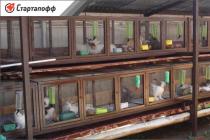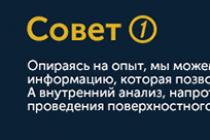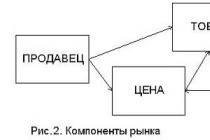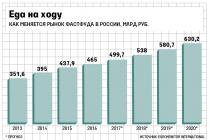Alexander Povalko
According to the order of the general meeting of shareholders, Alexander Povalko, who worked in the Ministry of Education of the Russian Federation and was a member of the Board of Directors of RVC, was appointed the new CEO of Russian Venture Company (RVC) and the chairman of the board of the company, according to the website of the Ministry of Economic Development.
“RVC is faced with the task of developing a new development strategy, taking into account the following key points. First, as a project office, RVC should bring support and implementation mechanisms to full deployment and operational capacity. Secondly, it is necessary to continue the integration of RVC and the Skolkovo Foundation, especially in terms of organizing venture financing for Skolkovo projects,” said Oleg Fomichev, Chairman of the Board of Directors of RVC - Deputy Minister of Economic Development of the Russian Federation.
At the end of June, the Board of Directors of RVC Igor Agamirzyan, who held the position of General Director and Chairman of the Board of the company since April 2009.
An open competition was announced for the position of General Director of RVC. The selection of a new candidate was carried out by the Ministry of Economic Development, which oversees RVC. Three main contenders participated in the competition - Deputy Chairman of the Government of the Samara Region, Minister of Economic Development, Investments and Trade of the Samara Region Alexander Kobenko, Deputy General Director of the Innovation Promotion Fund Pavel Gudkov and Deputy General Director of RVC Evgeny Kuznetsov. Kobenko won the competition, and in October, Deputy Prime Minister Arkady Dvorkovich, according to news agencies, "instructed the board of directors to prepare a directive for the appointment of Deputy Prime Minister Alexander Kobenko, Minister of Economic Development, Investments and Trade of the Samara Region."
Reference
Alexander Povalko from 2012 to 2016 served as Deputy Minister of Education and Science of the Russian Federation, oversaw the development and implementation of the state strategy in the scientific, technical and innovation fields and the education system. From 2008 to 2012 was Deputy Head of the State Committee of the Russian Federation for Youth Affairs, Deputy Head of the Federal Agency for Youth Affairs. From 2007 to 2008 From 1999 to 2000, he served as director of the strategic planning department of CJSC RENOVA-StroyGroup.
Graduated from the Moscow Aviation Institute. Ordzhonikidze with a degree in radio engineering, as well as the State University. Maimonides majoring in Applied Mathematics.
RVC was established in 2006 on the initiative of the Ministry of Economic Development, which oversees the company, the state is the only shareholder. The authorized capital of the company is 30 billion rubles, and its goals are the formation of a venture investment industry and assistance to the state in the development of the Russian innovation industry. RVC is a fund of funds, that is, it invests not directly in projects, but in funds, in which it always attracts private co-investors.
In 2015, the creation of a project office for the National Technology Initiative (NTI) - a long-term strategy for the country's technological development aimed at creating new global markets by 2035.
Russia Moscow
Agamirzyan Igor Rubenovich (General Director, Chairman of the Board of RVC OJSC)
RVC OJSC (RVC) is a state fund of funds and an institution for the development of the Russian Federation, one of the key instruments of the state in building a national innovation system. The headquarters is in Moscow.
RVC was established in accordance with the Decree of the Government of the Russian Federation dated June 7, 2006 No. 838-r.
Owners and management
100% of RVC belongs to the Russian Federation, the size of the authorized capital is 30 billion rubles.
Chairman of the Board of Directors:
- Vardanyan Ruben Karlenovich - Chairman of the Board of Directors of the Troika Dialog group of companies (independent director).
Members of the Board of Directors:
- Agamirzyan Igor Rubenovich - General Director of RVC OJSC;
- Guriev Sergey Maratovich - Rector of the non-state educational institution "Russian School of Economics" (independent director);
- Yigal Erlikh - head of the venture program "Yozma" (independent director);
- Oskolkov Ivan Valeryevich - Director of the Department of the Ministry of Economic Development of Russia;
- Sitnikov Aleksey Yuryevich - Head of the Department of International Cooperation of the Non-Profit Organization "Foundation for the Development of the Center for the Development and Commercialization of New Technologies" (Skolkovo Foundation);
- Udaltsov Yury Arkadyevich - Member of the Board, Director for Innovative Development of OJSC RUSNANO.
Management Board of JSC RVC
The board consists of seven people:
- Agamirzyan Igor Rubenovich, General Director - Chairman of the Board;
- Potapov Alexander Evgenievich, Deputy General Director - Executive Director;
- Korolev Nikolai Lvovich, Deputy General Director - Operations Director;
- Andrey Vvedensky, Director of the Department of Infrastructure and Regional Development;
- Kuznetsov Evgeny Borisovich, Director of the Department for Promotion of Innovations and Social Programs;
- Ryazantsev Yan Vladimirovich, director of the investment department;
- Tsygankov Mikhail Arnoldovich, Chief Investment Portfolio Manager.
Activity
RVC invests through private venture funds created jointly with private investors. The total number of funds formed by RVC OJSC has reached twelve (including 2 funds in foreign jurisdiction), their size is 26.1 billion rubles. The share of JSC "RVC" - more than 16 billion rubles.
The priority areas for investing in venture funds formed with the participation of RVC OJSC are determined in accordance with the List of Critical Technologies approved by the President of the Russian Federation, which includes:
- security and counter-terrorism;
- living systems (understood as biotechnology, medical technology and medical equipment);
- industry of nanosystems and materials;
- information and telecommunication systems;
- rational use of natural resources;
- transport, aviation and space systems;
- energy and energy saving.
- ZPIF OR(V)I "VTB - Venture Fund" (3.061 billion rubles);
- ZPIF OR(V)I Bioprocess Capital Ventures (RUB 3 bln);
- ZPIF OR(V)I Maxwell Biotech (3.061 billion rubles);
- ZPIF OR(V)I "Leader - Innovations" (3 billion rubles);
- ZPIF OR(V)I Tamir Fishman CIG Venture Fund (RUB 2 bln);
- ZPIF OR(V)I S-Group Ventures (1.8 billion rubles);
- ZPIF OR(V)I "New Technologies" (3.061 billion rubles);
- ZPIF OR(V)I "RVC Seed Investment Fund" (2 billion rubles),
- RVC Infrastructural Investments LLC (RUB 500 million, it is planned to increase the authorized capital to RUB 2 billion);
- RVC Biopharmaceutical Investments LLC (500 million rubles, it is planned to increase the authorized capital to 1.5 billion rubles);
Funds in foreign jurisdiction
- Russian Venture Capital I LP;
- RVC IVFRT LP.
At the beginning of June 2012, RVC funds invested in 118 innovative companies, including BrightSource, a manufacturer of solar energy stations, the Symbiotel IP telephony project, Innalabs' inertial navigation systems, Russian Navigation Technologies, a manufacturer and integrator of satellite monitoring and transport management systems, Seismoshelf's seismic equipment, OncoMax, a biotechnology company, and others. the total amount of invested funds - 10.2 billion rubles.
In 2012, RVC, together with the Fund for Assistance to the Development of Small Forms of Enterprises, the Fund for Infrastructure and Educational Programs Rosnano and the Russian Bank for Support of Small and Medium Enterprises (SME Bank) established the first in Russia rating of innovative companies TechUp.
RVC signed 27 cooperation agreements with the regions of the Russian Federation.
Criticism
In July 2010, the collegium of the Accounts Chamber of the Russian Federation considered the results of a comprehensive audit of the effectiveness of the management of property contributions of the Russian Federation. The press release of the Accounts Chamber of the Russian Federation on the meeting of the collegium says:
“In general, the planned control and indicative indicators of RVC's activities for 2009-2010 are not balanced with the goals and corresponding target indicators of the socio-economic development of the Russian Federation, defined in the Concept for the Long-Term Socio-Economic Development of the Russian Federation until 2020 and other strategic planning documents, including the Strategy for the Development of Science and Innovation in the Russian Federation for the period up to 2015. There is no system of indicators that characterize the effectiveness of the use of property contributions from the Russian Federation to the authorized capital of innovative companies. The bulk of RVC's financial resources are not invested in venture projects or innovative enterprises, but are placed on deposits in banks.”
According to the supervisory authority, RVC preferred to direct funds not for its core activities, but for deposits in banks: over the specified period, a total of 5.45 billion rubles were invested in venture projects. from the authorized capital of RVC, and the remaining funds, more than 25 billion rubles, remained in bank deposits.
see also
Notes
Links
Wikimedia Foundation. 2010 .
Russian venture company- OJSC Russian Venture Company (OJSC RVC) was established in accordance with the Decree of the Government of the Russian Federation dated June 7, 2006 No. 838-r with the aim of stimulating the creation in Russia of its own venture investment industry, the development of innovative sectors of the economy and the promotion of Russian science-intensive technological products to the international market.
The authorized capital of OAO RVC is 28,225,879,400 rubles.
Activities
The main objectives of RVC's activity are: to stimulate the creation of its own venture investment industry in Russia and to significantly increase the financial resources of venture funds.
The role of RVC in the innovation system is the role of the state fund of venture funds, through which the state stimulates venture investments and provides financial support for the high-tech sector as a whole.
RVC's investment activities are aimed at attracting private Russian and foreign investors to innovative segments of the Russian economy, as well as at developing new investment instruments for the national venture capital market.
This direction of activity is implemented through the creation of funds on the basis of public-private partnership. RVC pays special attention to knowledge-intensive sectors with a low presence of private capital, which are important for a balanced innovative development of the country.
Management
The Federal Agency for State Property Management exercises the powers of the general meeting of shareholders of the open joint-stock company Russian Venture Company (OJSC RVC), 100% of whose shares are owned by the Russian Federation.
General directors of RVC:
- from December 2016 - Povalko Alexander Borisovich
- from April 28, 2009 to 2016 - Igor Agamirzyan.
- until March 2009 - Alexey Korobov.
Investment area
The priority areas for investing in venture funds created with the participation of RVC are determined in accordance with the list of critical technologies approved by the President of the Russian Federation:
- Security and counter-terrorism;
- Living systems (understood as biotechnology, medical technology and medical equipment);
- Industry of nanosystems and materials;
- Information and telecommunication systems;
- Rational nature management;
- Transport, aviation and space systems;
- Energy and energy saving.
Funds
The total number of funds formed by RVC JSC has reached 27, their total amount is 51.3 billion rubles. The share of RVC JSC is 26.8 billion rubles. The number of innovative companies invested by RVC funds reached 202. The total amount of invested funds is 17.8 billion rubles.
With the participation of capital, by December 2017, RVC formed 26 funds. Their total amount was about 35.1 billion rubles. The share of RVC in the established funds is 22.5 billion rubles, the number of portfolio companies approved for investment by RVC funds has reached 217.
The total amount of funds approved for investment in innovative companies amounted to about 17.1 billion rubles (excluding projects that were withdrawn from).
By December 2016, 21 funds (including two funds in foreign jurisdictions) were created with the participation of RVC capital, their total amount is 32.3 billion rubles. The share of RVC JSC - 19.9 billion rubles
The organization reports that in 2016 the number of innovative companies approved for investment by the funds of RVC JSC reached 194. The total amount of funds approved for investment is 17.5 billion rubles.
Seed Investment Fund
RVC Biofund
In June 2010, RVC approved the concepts of the Biopharmaceutical Cluster Fund (“RVC BioFund”). At the beginning of 2011 RVC Biopharmaceutical Investments JSC was established.
The initial value of the "Biofond" was 500 million rubles. (about $16 million) with a planned increase to 1.5 billion rubles. ($48.6 million).
Biofond is focused on investing not only in biopharmaceutical companies, but also in service and infrastructure companies offering information, analytical and consulting services in medicine, pharmaceuticals and biotechnology.
RVC Cluster Fund of Information and Telecommunication Technologies, Embedded Intelligent Systems, Mechatronics and Robotics
According to the head of RVC, companies in the domestic IT sector do not experience a big shortage of investments from venture funds, since apart from RVC, almost all venture investors in Russia work with IT companies.
- On April 13, 2011, RVC for the first time officially confirmed its intention to create a trust fund for investing in the IT industry.
The new fund will be called the RVC Cluster Fund of Information and Telecommunication Technologies, Embedded Intelligent Systems, Mechatronics and Robotics, and its capital, according to Andrei Vvedensky, Director of the RVC Programs and Projects Department, will be up to 2 billion rubles. This amount is comparable to RVC's total investment in 2010, which amounted to 2.7 billion rubles.
The interests of the new fund will be extremely broad. As examples of projects where investments could be directed, top managers of RVC, in addition to industrial and household robotics, name IT control systems for low-profit oil wells and the creation of "smart houses" (in which energy management systems can reduce housing and communal services costs by 30-50%). However, they say, the fund's investments, most likely, will not be limited to these areas.
Director of RVC Igor Agamirzyan said that the registration of the fund as a subsidiary of the OJSC Russian Venture "company" can be expected at the end of 2011, and its financial content "will be phased, as projects are approved." The first investments of the "fund for robots" will be made in the first months of 2012.
It is important to note that, unlike most venture funds created by RVC, a large partner-co-investor will not be invited to the cluster "fund for robots". According to Agamirzyan, “the fund will not be a leading investor at the project level, it will co-invest where there is already private capital.”
The head of the RVC speaks of the investment goals of the newly created fund as "horizontal" - capable of affecting all sectors of the economy. Therefore, it is difficult to estimate the volume of the market for “robotics, mechatronics and intelligent systems” (see Industrial robotics).
Regional venture funds in small enterprises in the scientific and technical field
In June 2010, the Board of Directors of JSC Russian Venture Company approved the concept of the RVC Infrafund. At the beginning of 2011, RVC Infrastructural Investments (RVC Infrafund) limited liability company began its work.
The key task of the RVC Infrafund is to develop the market of specialized services and services necessary for technology companies to effectively conduct their core business and accelerate development, promote products on the domestic and foreign markets. The new infrastructure will provide innovative entrepreneurs with consulting services in the areas of marketing, finance, law, intellectual property, investor relations and others.
Venture fund for the project "Personnel for the Digital Economy"
The fund is created in pursuance of the federal project "" of the national program "Digital Economy of the Russian Federation" of the Government of the Russian Federation for the development of promising educational technologies using the best world technological solutions to increase the efficiency and accessibility of education. As part of the Fund's activities, it is planned to develop Russian technology companies in the field of education with their subsequent expansion abroad, as well as the transfer of world educational technologies to Russia.
The total volume of the fund will amount to 7 billion rubles due to the provision of RVC from the federal budget in 2019-2021. budget investments with an increase by the equivalent part of the participation of the Russian Federation in the authorized capital of RVC. The term of the Fund will be 10 years with the possibility of a two-time extension for a period of 1 year. The Fund will be organized in the form of an investment partnership, while the managing partner of the Fund will be determined as a result of an open selection procedure.
As part of the Fund's activities, it is planned to organize acceleration activities, which will expand the funnel of potentially successful projects and stimulate the development of new technological solutions.
Story
2020
Identification of research centers and companies to finance the development of end-to-end technologies
On January 10, 2020, RVC determined the winners of the competitive selection of leading research centers (LRCs) and leading companies in the development of products, services and platform solutions based on "end-to-end" digital technologies. RVC will send 2.8 billion rubles to the winners of the tenders. 2 billion rubles - PERSONS, leading companies - 792 million rubles. Read more.
2019
Where and how much RVC invested in 2019
RVC investments in portfolio companies in 2019 amounted to 1.3 billion rubles, and the total volume of transactions by exits reached 2.3 billion rubles, an increase of 35% compared to 2018. The Russian Venture Company published its annual results on January 27, 2020.
By the beginning of 2020, RVC includes 29 venture funds, including the New Industry Ventures fund created in 2019 jointly by Gazprom Neft and co-investors, a fund with the Ministry of Industry and Trade of the Russian Federation in the field of the pharmaceutical and medical industry, as well as a fund with the Ministry of Economic Development of the Russian Federation to support promising educational technologies. Other partners of RVC in the creation of new funds include the investment company Terra VC, the State Transport Leasing Company (GTLK) and Russian Railways.
In 2019, funds with the participation of RVC capital approved the provision of investments to 24 companies in the amount of 1.4 billion rubles, including 6 projects in the amount of 573 million rubles. During the year, 24 exits of RVC funds from portfolio companies took place.
By the beginning of 2020, the portfolio of RVC funds includes 180 companies. At the same time, 270 companies received investments from RVC funds at the beginning of 2020. The volume of funds created with the participation of RVC capital increased by 32% in 2019 and reached 64.4 billion rubles.
| One of the key results of last year was the formation of a fundamentally new market instrument - the creation of two venture funds for the transformation of the educational and medical industries, - says Alexei Basov, Deputy General Director - Investment Director of RVC. - The state has demonstrated its readiness to create repayable financing instruments using market mechanisms to support promising teams, technologies and projects. |
Approval of the digital transformation strategy
On December 19, 2019, RVC informed TAdviser about the approval of the digital transformation strategy.

The company's strategy is calculated until 2021. Its main goal is to create a transparent and convenient system of relations between the company and partners - from investment teams of venture funds to startups participating in RVC accelerators and NTI projects.
The digital transformation strategy, as indicated by the companies, includes, in particular, such areas as information exchange between RVC and venture funds, aggregation and monitoring of data on funds and portfolio companies, managing relationships with recipients of RVC support measures, partners and experts.
In 2019, in addition to RVC, many other state companies and state corporations adopted digital transformation strategies.
Selection of Unicorn Capital Partners to manage a fund of high-tech medical projects
On December 18, 2019, RVC announced to Zdrav.Expert that it had determined the winner of the selection to manage a fund for high-tech medical projects.
According to the results of the open selection, the investment team of Unicorn Capital Partners scored the highest number of points. Read more.
Public discussion of drafts of preliminary national standards in the field of IoT and IIoT
Establishment of the AI Standardization Technical Committee
On May 21, 2019 it became known that on the basis of the Russian Venture Company (RVC) the Technical Committee (TK) on standardization of artificial intelligence (AI) will begin work. His area of responsibility will be issues related to the regulatory and technical regulation of the applied use of AI technologies. More
2018
Development of the Strategy for the Development of the Venture Capital and Direct Investment Market
The purpose of the agreement is the implementation of projects and programs in the field of NTI and digital development in the city, the development of venture investment and the ecosystem in St. Petersburg, as well as the popularization of technological entrepreneurship.
Cooperation will include, among other things, the development and implementation of joint NTI technology competitions. Also on the agenda are holding thematic events at the all-Russian and international levels, including project sessions, attracting venture investors to the region, participating in the development of the city's start-up community and innovative infrastructure.
| With the support of the Government of St. Petersburg on the territory of the LENPOLIGRAFMASH technopark, the opening of the regional ASI Boiling Point in St. Petersburg took place, bringing together on one site the best intellectual resources of the region that form modern society and its development (representatives of business, executive bodies of state power, engineers, scientists, teachers, students and graduate students. A Council for the implementation of NTI in St. Petersburg was formed, the main task of which is to ensure the leadership of St. Petersburg companies in high-tech markets, create in all the necessary conditions for their development, as well as to assist in the preparation of innovative projects for participation in the NTI and the development of proposals for the provision of support measures for organizations participating in the NTI. Sergey Movchan, Vice Governor of St. Petersburg |
| “St. Petersburg confirms the status of one of the scientific and educational centers of the country. In 2017, the city topped the rating of the Association of Innovative Regions of Russia. An active technological community of young innovative companies, leading engineering universities, business incubators, technology parks is concentrated here. On the basis of SPbPU, the NTI Competence Center for Production Technologies successfully operates, and at ITMO University there is a national center for cognitive development. St. Petersburg is already one of the supporting regions for the development of NTI, we expect that our cooperation will be filled with joint projects. Alexander Povalko, General Director of RVC |
2017
Results of the year: 26 funds, investments for 14 project companies
As of the end of 2017, 26 funds were formed with the participation of RVC capital, the total amount of which amounted to about 35.1 billion rubles. At the end of 2017, the main sectoral areas of investments of funds formed with the participation of RVC capital were medical technologies and pharmaceuticals (30%), information technologies and the Internet (29%), and energy (10%).
During the year, 11 project companies were approved for investment for a total of 438.4 million rubles. In general, in the direction of investment activity, RVC funds in 2017 approved the provision of investments to 14 project companies for a total of 507.82 million rubles. The total amount of funds approved for investment reached 17.1 billion rubles.
In 2017, there were 6 exits from the portfolio companies of funds with the participation of RVC capital.
In addition, in 2017, RVC's development strategy for 2017-2030 was approved, which defines the mission, strategic goal and tools that ensure the operation of the company's key areas of activity: the development and implementation of financial and non-financial tools for developing the venture capital investment and technology entrepreneurship market, stimulating the creation of Russia's own venture capital investment industry and performing the functions of the Project Office of the National Technology Initiative (NTI).
| The strategic goal of RVC is to achieve by 2030 the scale of activity comparable to similar European organizations. We focus on the formation of a mature sustainable venture capital market in the country,” said Alexander Povalko, General Director of RVC. “We will form a system that ensures the implementation of a sufficient flow of projects. As a development institution, RVC takes into account the priorities set by the state, and almost all of our tools will be aimed at achieving the objectives of the NTI. |
The strategic goal of RVC is planned to be achieved mainly through the creation of new funds with the involvement of professional investors, investments in existing funds, technology companies, and work with portfolio companies of the funds.
RVC's international activities in 2017 were aimed at creating a positive attitude towards Russian innovations in the global market, integrating technology companies into global technology chains and globalizing the Russian venture capital market. The geography included developed markets in Europe and North America, as well as technology hubs - Singapore, South Korea, Israel and others.
At the end of 2017, the network of foreign partners of RVC consisted of 1,500 organizations of the innovation ecosystem from 40 countries of the world and included government agencies, corporations interested in new technologies, universities and technical transfer centers, state development institutions and venture funds. Export revenue of portfolio companies of RVC funds for the three quarters of 2017 amounted to 1.88 billion rubles.
Agreement with the Venture Committee of the All-China Association for the Financial Promotion of Science and Technology
As part of the partnership, a Russian-Chinese working group will be created. Its main tasks will be the joint preparation and implementation of programs and projects, as well as monitoring and analysis of cooperation activities.
RVC and Skolkovo create three venture funds with a volume of at least 6.6 billion rubles
According to the terms of the June 2017 agreement, RVC will invest RUB 1.5 billion in each fund. Attracted external co-investments will amount to at least 0.5 billion rubles. during the first 12 months of operation of each fund, as well as an additional 0.2 billion rubles. over the next 6 months. Thus, the total amount of funds will reach at least 6.6 billion rubles.
Funds are created in three industry areas: information technology, biomedicine and industrial technology. Investment priorities have been developed taking into account the interests of implementing the "road maps" of the National Technology Initiative, as well as stimulating the commercialization of the results of research and development of companies participating in the Skolkovo Foundation.
The funds intend to invest in Russian technology companies capable of becoming world leaders in their market segments. The share of such investments should be at least 50%. It is planned that the total number of companies invested by each fund will be at least eight, including early-stage projects and mature companies. At the same time, the volume of investments in each company will not exceed 10% of the total volume of investment obligations. The managing company of the funds was LLC Skolkovo - Venture Investments, a joint company of RVC and Skolkovo.
2016: Alexander Povalko is appointed the CEO of RVC
Cooperation was to be carried out in several directions:
- educational programs for entrepreneurs involved in high technology and innovation;
- programs aimed at supporting and accelerating the development of small innovative companies, including the joint organization and holding of investment competitions and other events that contribute to the implementation of this task;
- cooperation in the creation and development of a system for collecting and preparing analytical information on investment activity in the Russian venture capital market (similar to the MoneyTree™ study published by PwC together with the National Venture Investment Association and Thomson Reuters in the USA);
- providing consulting support to small innovative and technology companies, as well as Russian and foreign venture funds investing in innovation and technology projects.
In order to implement the Memorandum of Understanding, PwC and RVC have created a working group that will prepare recommendations for joint events, programs and projects, their implementation, as well as monitor and analyze cooperation under the Memorandum.
Igor Rubenovich Agamirzyan, CEO of the Russian Venture Company, noted:
“While transferring the country to an innovative development path, we urgently need to master the best practices of the international venture market and innovative and technological entrepreneurship, access to the know-how of this business. In Russia, in a short time, all the necessary competencies and tools should be concentrated both for attracting venture capital investments and for independently conducting them. However, that's not all. We also urgently need the emergence of high-quality and affordable - at a price and throughout the country - consulting services of the widest range for Russian innovative companies. And here, interaction with colleagues from PricewaterhouseCoopers can be very useful. We are confident that the Memorandum signed with PwC is only the first step in our long-term and mutually beneficial cooperation.”
Checking the Accounts Chamber
On July 16, 2010, as a result of consideration of the results of the control measure "Comprehensive verification of the effectiveness of managing the property contributions of the Russian Federation" by the Collegium of the Accounts Chamber of the Russian Federation chaired by Sergey Stepashin, a number of systemic problems were identified that directly affect the efficiency of the functioning of RVC in the field of innovation economy and the formation of a venture capital environment.
As stated in the message on the official website of the Accounts Chamber of the Russian Federation, the planned control and indicative indicators of the activities of RVC for 2009-2010. are not balanced with the goals and corresponding target indicators of the socio-economic development of Russia, defined in the Concept of long-term socio-economic development of the Russian Federation until 2020 and other strategic planning documents, including the Strategy for the Development of Science and Innovation in the Russian Federation for the period up to 2015.
In particular, there is no system of indicators that characterize the effectiveness of the use of property contributions from the Russian Federation to the authorized capital of innovative companies. As established by the audit, the bulk of RVC's financial resources are not invested in venture projects or innovative enterprises, but are placed on deposits in banks. As a result, the Board decided to send the presentation of the Accounts Chamber of the Russian Federation to the Ministry of Economic Development of Russia, as well as a report on the results of the audit to the chambers of the Federal Assembly of the Russian Federation.
Investment in BrightSource Energy
The British fund RVC - Russian Venture Capital I LP - invested $10 million in BrightSource Energy, a solar energy company.
Joining the IVP XIII venture fund
In September 2010, RVC announced the closing of a deal to join the late-stage venture fund Institutional Venture Partners XIII (IVP XIII). IVP formed a new fund of $750 million with a focus on late-stage technology innovation companies in August 2010. RVC's investment in IVP XIII fund amounted to $10 million.
“The accession of RVC to the international fund of the late stage will allow us to achieve several strategically important goals at once,” said Yan Ryazantsev, director of the investment and expertise department of RVC. - Obtaining information about the methods and methodology for the formation of late-stage venture funds; access to extensive information about the most relevant ("hot") transactions in the venture capital market; development of a partner network by building relationships with other investors in the emerging venture fund; attracting fund partners to the Russian technology market as strategic co-investors and much more.”
Joining an international venture fund is a popular way to improve investment skills, says Yuri Ammosov, scientific director of the Innovation Institute at the Moscow Institute of Physics and Technology. Singapore, he says, has been investing venture money in this way for 15 years and "it helped him." “IVP is one of the largest venture funds and it is quite difficult to get there, so this is a great achievement for RVC,” the expert adds.
Resigned. Together with him, CFO Olga Golikova and Executive Director Oksana Artyukhova left the company. Aleksey Vladimirovich Kuzmin was appointed as the new General Director of RVC, who stayed in this position for several days.
The head of the Russian Venture Company (RVC), Igor Agamirzyan, stepped onto the huge stage of the Open Innovations Forum, one of the main technology shows in Russia, and began to casually and slightly imposingly talk about how innovations should be developed. “As long as we do something for the day after tomorrow, there is still hope for success. It's like shooting at a moving target - if we don't shoot ahead of the curve, we're guaranteed to miss," Agamirzyan argued. Six months later, he himself was targeted and in June 2016, seven years after his appointment, he resigned.
Why did Agamirzyan have to leave his post, and why did the government think about liquidating the oldest venture laboratory?
seed stage
At a meeting of the State Council in February 2006, a dispute broke out over the future of venture capital investment in Russia. Deputy Minister of Economic Development Andrey Sharonov and Minister of Communications Leonid Reiman argued. Sharonov believed that the state venture fund should be universal, Reiman defended his position: focus only on information technology. Vladimir Putin put an end to the dispute: “I don't care: either IT (industry) or general. But this year." So it was decided to create a Russian venture company.
RVC was conceived as a fund of funds, with the task of creating 10-15 venture funds to invest in startups. RVC invested money together with private investors, receiving 50% minus 1 share in funds; it did not invest directly in companies. The idea didn't come out of nowhere. For example, a similar state fund Yozma with a total volume of $100 million was already functioning in Israel. At the time of the creation of Yozma in 1993, there was practically no venture capital market in the country, and 10 years later there were already 60 venture funds with a total volume of $10 billion, large corporations Cisco, IBM, Intel, Microsoft came. The state fund itself was privatized back in 1997 and successfully exited most of the projects.
In Russia, they hoped for the same success and even invited one of the creators of Yozma, Yigal Erlich, to the board of directors of RVC. The Russian state fund received 30 billion rubles ($1.1 billion) in management. The new structure was headed by Alexei Korobov, who previously headed the apparatus of the Committee on Budget and Taxes of the State Duma and worked as First Deputy Chairman of the RFBR. Korobov held his post for only two years. “I don’t see support either from the Ministry of Economic Development or from the board of directors [RVC],” Korobov explained the decision to resign. His departure was provoked, among other things, by the claims of the Prosecutor General's Office.
By the beginning of 2009, RVC invested only 15% of the money it had in funds, the vast majority of the funds lay on deposits in banks - RVC earned about 3 billion rubles on interest, Korobov said. The Prosecutor General's Office considered such activities ineffective: the funds are dead weight, and not invested. Moreover, law enforcement agencies have had claims against several funds. And it was decided to adjust the principles of operation of the state venture fund.
Deposit stage
In April 2009, a new CEO appeared at RVC - Igor Agamirzyan. He managed to work both in Russian science and in large Western IT companies Microsoft and EMC. “He came to RVC from world business with the idea of heading the headquarters of the technological revolution, building a venture economy in Russia,” says one of Agamirzyan’s acquaintances. With his arrival, the concept changed: RVC began not only to invest in funds, but also began to popularize investments in innovative projects. “Startups do not grow in an open field: they need to be fertilized, watered, and cared for. It is quite clear where this topic with popularization comes from, ”says Aleksey Solovyov, managing director of Prostor Capital venture fund.

Agamirzyan repeatedly repeated that there are many ideas in Russia, but it is impossible to make a business out of them. “The investment of the development institute in business development ultimately gives more profit to everyone in the venture capital market,” he says in an interview with Forbes. The team led by the new CEO enthusiastically got down to business: they began to work on the development of the legislative framework, created their own network of private investors and companies, held conferences and start-up competitions. “We still lacked competencies, management teams, and a regulatory framework,” says Oleg Fomichev, Deputy Minister of the Ministry of Economic Development.
 At the same time, RVC continued to invest in funds, but after the claims of the Prosecutor General's Office, a clause appeared in the contracts on providing full information on the movement of funds. In total, in 2010, funds with the participation of RVC invested 2.7 billion rubles. However, the state-owned company's investments lagged behind the business plan. For example, in 2010, at the seed stage, 20 companies were invested instead of the planned 25, at later ones - 38 instead of 53. This raised questions from the Accounts Chamber: according to auditors' calculations, for the entire time of its existence, RVC has invested only 23% of the authorized capital in funds - about 7 billion rubles, the rest of the money was still on long-term deposits. In the next two years, investment rates increased slightly: in 2011, funds with the participation of RVC invested 2.3 billion rubles, in 2012 - 2.9 billion rubles.
At the same time, RVC continued to invest in funds, but after the claims of the Prosecutor General's Office, a clause appeared in the contracts on providing full information on the movement of funds. In total, in 2010, funds with the participation of RVC invested 2.7 billion rubles. However, the state-owned company's investments lagged behind the business plan. For example, in 2010, at the seed stage, 20 companies were invested instead of the planned 25, at later ones - 38 instead of 53. This raised questions from the Accounts Chamber: according to auditors' calculations, for the entire time of its existence, RVC has invested only 23% of the authorized capital in funds - about 7 billion rubles, the rest of the money was still on long-term deposits. In the next two years, investment rates increased slightly: in 2011, funds with the participation of RVC invested 2.3 billion rubles, in 2012 - 2.9 billion rubles.
Why did RVC keep funds on deposits? As Agamirzyan explains, the money was reserved for funds, but was transferred to them only as projects were prepared. “This is how LP work all over the world. Deposits in banks cannot be considered free funds,” Agamirzyan believes. According to him, the money was placed in banks on the condition that they go to loans to small and medium-sized businesses. “RVC made money on this and redistributed money to promote the technology business,” explains Agamirzyan. However, a Forbes interlocutor, close to the board of directors of RVC, says that only half of the amount was placed under such conditions.
Stage of growth and shrinkage
In 2013, there was a peak in venture capital investments in Russia: at the end of the year, the Russian market came in second place in Europe and fifth in the world. “When RVC was created, its money was half of the market, but by 2013 big money came in, and RVC funds began to occupy about 5% of the market,” says Fomichev. According to RVC, in Russia at that time there were 173 venture funds that managed about $5.2 billion in capital. In Russia, the well-known American fund Accel Partners closed the first deals, and Intel Corporation actively invested.
RVC fulfilled its function? As sources in RVC and several venture funds told Forbes, it was in 2013 that the government came up with the idea to change the CEO of RVC. “He didn’t suit a lot of people. He did little real business, a lot of events and PR. At the same time, the company had huge funds in the accounts that did not give anyone rest, ”says a partner in one of the venture funds, who was offered to head a state-owned company. Claims against Agamirzyan were still the same: RVC is too small and invests slowly.
It is customary for venture funds to conduct transactions in the jurisdictions of Cyprus, the British Virgin Islands, and Delaware. RVC adhered to the general rules and even invested in foreign funds itself. Back in 2010, she created the management company Russian Venture Asset Management Ltd for investments in the UK and RVC Usa Inc in the USA. In 2012-2013, RVC invested through them in three startups and four funds in Silicon Valley. “We have invested in foreign companies to organize technology transfer to Russia. And in financial terms, these were the most profitable investments of RVC,” says Agamirzyan. However, in 2013 the government took the path to deoffshorization. “Before 2013, it was practically impossible to create venture funds in Russian jurisdiction - not a single foreign or Russian investor felt protected,” says Fomichev. According to him, the creation of new funds in 2013 and early 2014 practically froze: negotiations began anew even on those transactions where due diligence had already been carried out. As a result, several funds in 2014 were still registered in Russia under a new scheme - as joint stock partnerships. The legal framework for this was created back in 2011, but transactions were not practiced.
 The venture capital boom in Russia was short-lived. Already in 2014, after the annexation of Crimea and the sanctions that followed, many Western funds stopped investing in Russia, and Russian funds increasingly chose to invest in foreign companies. The situation was aggravated by the developing economic crisis. At the end of 2014, the volume of the Russian venture ecosystem amounted to $1.69 billion, although in 2013 the volume reached $2.89 billion.
The venture capital boom in Russia was short-lived. Already in 2014, after the annexation of Crimea and the sanctions that followed, many Western funds stopped investing in Russia, and Russian funds increasingly chose to invest in foreign companies. The situation was aggravated by the developing economic crisis. At the end of 2014, the volume of the Russian venture ecosystem amounted to $1.69 billion, although in 2013 the volume reached $2.89 billion.
RVC forecasts indicated that funds created in 2007-2008 would receive a return on investment no earlier than 2017. RVC needed a reserve of funds for additional tranches to existing funds and projects. But the money in her accounts still haunted many. “At first, the state seemed to agree that the money in the venture capital market should work, but during the crisis they forgot about it and asked for the money back,” says a source close to RVC. According to another source, in 2015, Rosnano and Skolkovo allocated 60 million rubles each, and RVC - 110 million rubles, to hold the Open Innovations forum in 2015. “It's like planting potatoes in the morning and digging them up in the evening because you want to eat,” Agamirzyan resents.
Merge stage
In December 2014, the problem of the lack of innovation in Russia again sounded from the highest tribunes. President Vladimir Putin, in a message to the Federal Assembly, announced a new program to support technological developments, which was called the National Technology Initiative (NTI). “On the basis of long-term forecasting, it is necessary to understand what challenges Russia will face in 10-15 years,” the president said. The Agency for Strategic Initiatives became the ideologist of the new program, but the task of implementing and managing the money was assigned to RVC.

“There wasn’t much money in the budget, and NTI had to be launched,” the federal official explains. RVC then refused to invest in IT projects and looked at promising industries like biotechnology, where there was not enough private funding. “For RVC, the project has become a lifesaver. After all, clouds were already gathering over RVC amid dissatisfaction with the fact that they were doing more PR, ”adds the Forbes interlocutor. The project was agreed upon with presidential aide Andrei Belousov, and Pavel Bulavin, who worked in international consulting and managed several projects in the organizing committee of the Sochi Olympics, became the director of the NTI project office. But again there were problems.
Formally, Bulavin was subordinate to Agamirzyan and had to coordinate all decisions with him. But, as several people told Forbes, they had a personal conflict. “I found a scythe on a stone, both sides are approximately to blame,” says one of Forbes’ interlocutors. The problem was solved by separating the powers of Agamirzyan and Bulavin, but the creation of the project office was delayed for two months. This caused a strong reaction from both Belousov and Arkady Dvorkovich, who since January 2016 became the project curator in the government apparatus, according to a Forbes interlocutor. A spokesman for Dvorkovich declined to comment for this article. “There was no personal conflict, Bulavin’s subordination to me was initially purely formal, the division of powers was agreed from the very beginning,” says Agamirzyan.
 At the same time, the struggle for RVC money resumed - at the end of 2015, 20.1 billion rubles lay on deposits. The management of Skolkovo offered to send money to the state-owned company to finance residents, the initiative was supported by the Ministry of Finance. Representatives of Skolkovo declined to comment, the Ministry of Finance did not respond to a request from Forbes. “Agamirzyan and his team have completely gone into “higher matters”. Their "castles in the air" did not like the Ministry of Finance, who wanted to know what the budget allocated amounts were for, ”says a Forbes interlocutor in one of the development institutions. In 2015, RVC held tenders for almost 700 million rubles: most of them concerned conferences, speeches, competitions (for comparison: in 2013, the volume of tenders was half that). At the same time, RVC funds transferred about 651.2 million rubles, most of the money went to recapitalize the American fund.
At the same time, the struggle for RVC money resumed - at the end of 2015, 20.1 billion rubles lay on deposits. The management of Skolkovo offered to send money to the state-owned company to finance residents, the initiative was supported by the Ministry of Finance. Representatives of Skolkovo declined to comment, the Ministry of Finance did not respond to a request from Forbes. “Agamirzyan and his team have completely gone into “higher matters”. Their "castles in the air" did not like the Ministry of Finance, who wanted to know what the budget allocated amounts were for, ”says a Forbes interlocutor in one of the development institutions. In 2015, RVC held tenders for almost 700 million rubles: most of them concerned conferences, speeches, competitions (for comparison: in 2013, the volume of tenders was half that). At the same time, RVC funds transferred about 651.2 million rubles, most of the money went to recapitalize the American fund.
According to an RVC employee, Agamirzyan wanted the state-owned company to be perceived on the market as one of the venture funds, and not an instrument of the state. “No one liked that RVC adopts a strategy at an internal meeting, and does not hold a strategic session with representatives of other development institutions and members of the government,” says Forbes source. At the same time, RVC, on the one hand, was supposed to earn money, and on the other hand, to develop the venture capital market free of charge. “All this time, all the discussions were, in fact, about how to combine these two areas, how to streamline work,” says economist Alexander Auzan, a member of the board of directors of RVC.
The Ministry of Economic Development had to defend the independence of RVC before the Ministry of Finance. “In the event of a merger with Skolkovo, RVC would become just a money bag, because Skolkovo’s mandate contains nothing about supporting the venture capital market,” Forbes’ interlocutor familiar with the negotiations explains the position of the Ministry of Economic Development. There is no final decision on the merger of Skolkovo and RVC yet, says Open Government Minister Mikhail Abyzov. “All proposals for the reform of development institutions have been sent to the government, the work process is underway,” he assures. Nevertheless, a decision has already been made to move RVC to Skolkovo. “But this does not mean that the company will be managed by Skolkovo,” says Fomichev. “In the context of reduced budget funding, cutting the functions of one or more development institutions is inevitable,” says Andrey Trapeznikov, Deputy Chairman of the Board for External Communications at Rosnano.
Against the backdrop of negotiations on the future of RVC, Agamirzyan wrote a letter of resignation. “They parted ways with Agamirzyan, and dull discontent has accumulated,” says a top manager at one of the development institutions. However, according to him, it is impossible to formally say that RVC did something wrong. “The state-owned company, in fact, did not have specific tasks, so everything that they did at RVC was simply not noticed by the market,” adds the Forbes interlocutor. As an acquaintance of Agamirzyan says, he was unable to create a team focused on the practical result: “They became hostages of their isolation from life, the desire to reason beautifully.”
By the end of 2015, according to Agamirzyan, 23 funds with a total volume of 33.7 billion rubles were created with the participation of RVC. For 10 years, the state-owned company participated in the financing of 200 projects and made about 20 "exits". “In total, during this time we have earned more than 10 billion rubles, paid several billion in taxes and dividends to the state,” says Agamirzyan. Now his duties are temporarily performed by his deputy Yevgeny Kuznetsov, but the Agency for Strategic Initiatives and the Ministry of Economic Development are holding an open competition for the position of general director of RVC. “I hope there will be about 100 candidates. The task is also to make the new person look at everything with a fresh look, Fomichev argues. “By the end of September, we will have a new CEO, and in November we will move to Skolkovo, and a new life will begin for us.” In mid-August, 134 applications were received for the post of General Director of RVC.














